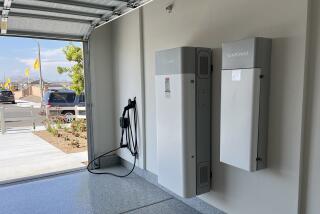Generator Takes Over in Power Failure
- Share via
Question: We have a newer home with all the convenience appliances, security system, etc., but we have occasional power outages. Are there automatic whole-house emergency generators for homes?
Answer: In today’s homes, a power outage can be a severe problem, and the outages are more common than they used to be. If you are away from home when the outage occurs, your lights are off and your security system is down. This is an invitation to thieves. If you have a sump pump, expect a flooded floor too.
There are automatic whole-house (natural gas, propane or diesel) generator systems that can power your entire home. When the power goes off, the generator is providing full power again within seconds.
The only problem is getting one installed quickly. With the justified concern about Y2K power outages come Jan. 1, there is a huge demand for these systems.
Keep in mind that in the winter when the electricity is off, your oil or gas furnace stops too. In the summer, brownouts (lower than normal voltage) can be damaging to your electrical devices, especially ones with motors.
These whole-house models look like a central air-conditioning unit outside your house. For the typical home, I would recommend a unit with an output capacity of eight to 12 kilowatts. For exact sizing, total the wattages of all the appliances you want to keep running during an outage.
Definitely have an automatic transfer switch installed too. Even before the power goes completely off, the switch detects the lower voltage and starts the generator. It also disconnects your house from the power grid until the utility gets the power back on.
The best and most convenient transfer switches also have electronic brains. This type starts the generator for 15 minutes every week to make sure it is always ready. It also keeps track of the total hours run for the maintenance schedule. It holds the voltage very steady.
Most whole-house generator systems are powered by small air-cooled engines, like a motorcycle engine. Natural gas-powered ones require only an oil change every 100 hours of operation. If you do not have natural gas, it can be powered by propane or diesel. They all operate very quietly.
The cost to run one, even for extended power outages, is not outrageous. When powered on natural gas, the fuel cost (dependent on your local rates) is equivalent to about 13 cents per kilowatt-hour. The only additional operating cost is changing the engine oil and an occasional tuneup.
Write for (or instantly download at https://www.dulley.com) Update Bulletin No. 822, a buyer’s guide to automatic whole-house emergency generator systems, power outputs, fuel types, features, prices and a sizing chart. Please include $3 and a business-size, self-addressed, stamped envelope, and mail to James Dulley, Los Angeles Times, 6906 Royalgreen Drive, Cincinnati, OH 45244.
*
James Dulley has written a new 224-page book, “Affordable Efficient Houses,” which includes 235 floor plan layouts and exterior diagrams and 195 house manufacturers. Included in the nine chapters are: timber-framed, geodesic dome, modular, circular, log, steel-framed, panelized, post & beam and cedar houses. You can order this book for $14.95 (includes delivery) with check payable to James Dulley. Mail to James Dulley, Houses, P.O. Box 54987, Cincinnati, OH 45254 or visit www.dulley.com/houses.htm.


